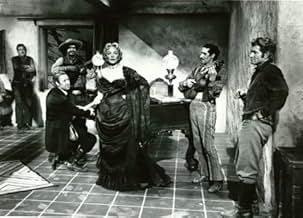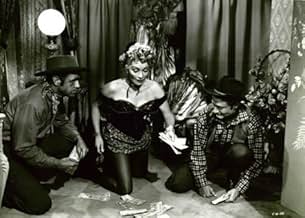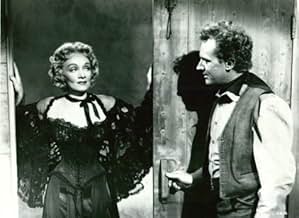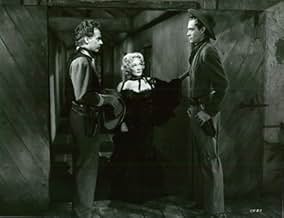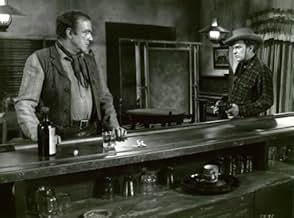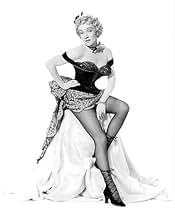AVALIAÇÃO DA IMDb
6,8/10
5,9 mil
SUA AVALIAÇÃO
Adicionar um enredo no seu idiomaAfter the murder of his fiancée, a Wyoming ranch hand sets out to find her killer.After the murder of his fiancée, a Wyoming ranch hand sets out to find her killer.After the murder of his fiancée, a Wyoming ranch hand sets out to find her killer.
- Direção
- Roteiristas
- Artistas
Rodd Redwing
- Rio
- (as Rodric Redwing)
Victor Adamson
- Racer with Fat Girl
- (não creditado)
Roger Anderson
- Red
- (não creditado)
Al Bain
- Race Spectator
- (não creditado)
Ray Beltram
- Barfly
- (não creditado)
- Direção
- Roteiristas
- Elenco e equipe completos
- Produção, bilheteria e muito mais no IMDbPro
Avaliações em destaque
I've heard RN called underrated and under appreciated and I can see why. It's not the best or perfect but it's different from most. The story is lean but heavy in undertones and gives it weight and moves along well.
"Rancho Notorious" is a beautifully atmospheric and suspenseful film. Best known for his expressionist black & white suspense thrillers, director Fritz Lang brings the same qualities to this Technicolor western.
Although she must have been in her fifties when the film was made, Dietrich looks absolutely gorgeous. She also seems to be having lots of fun with the part, in a sense reprising her character from "Destry Rides Again." It's never explained how this woman with the strange German accent ended up in the Wild West, and we don't really care. By the way, Dietrich's performance in these two films was the basis for Madeline Kahn's great parody in "Blazing Saddles."
The one thing that really stands out in my mind about this film is how effectively the suspense builds. The tension leading up to Vern's discovery of the killer's identity is almost unbearable, and Lang makes us wait until the film's last five minutes for the inevitable score-settling gunfight.
In a period of film history when westerns were a dime a dozen, this one really stands out as a true classic.
Although she must have been in her fifties when the film was made, Dietrich looks absolutely gorgeous. She also seems to be having lots of fun with the part, in a sense reprising her character from "Destry Rides Again." It's never explained how this woman with the strange German accent ended up in the Wild West, and we don't really care. By the way, Dietrich's performance in these two films was the basis for Madeline Kahn's great parody in "Blazing Saddles."
The one thing that really stands out in my mind about this film is how effectively the suspense builds. The tension leading up to Vern's discovery of the killer's identity is almost unbearable, and Lang makes us wait until the film's last five minutes for the inevitable score-settling gunfight.
In a period of film history when westerns were a dime a dozen, this one really stands out as a true classic.
Chuck-a-Luck is a hole in the wall type ranch where men with prices on their heads hide out and are given protection by Altar Keane (Marlene Dietrich) and her lover Frenchy Fairmont (Mel Ferrer) for ten percent of the loot brought in my the outlaws. Chuck-a-Luck is called Rancho Notorious in the film's title, which does sound somewhat better. Unfortunately a terrible narrative theme, "The Legend of Chuck-a-Luck" used throughout the movie becomes very grating to the ears. The ballad singer William Lee (who is he anyway?) doesn't help the situation. Fortunately the songs chosen for the talented Marlene Dietrich to perform are much better (actually one "Gypsy Davey" is an old British ballad that Woody Guthrie turned into a cowboy song). Her renditions are not quite on the level of her "See What The Boys In The Backroom Will Have" from the western classic "Destry Rides Again" but are still captivating. (Interesting that she played a saloon girl named Frenchy in "Destry" whereas this time her lover is named Frenchy.)
This is one of few so-called adult westerns from the 1950's that actually lives up to that label. The flashback barroom scene where the soiled angels are riding their customers in a drunken mock horse race as jockeys would ride horses shows how fun and games in Old West saloons really took place. The whores are not prima donnas as oft times shown in Hollywood films. Pay particular attention to the gross fat showgirl trying to ride a much smaller client. It is funny and repulsive at the same time. Fritz Lang takes away all window dressing. Even Marlene Dietrich looks much more slutty and rough around the edges than she did in "Destry." Being over a decade older gives even more authenticity to Dietrich's character. She looks like a much older Lola Lola from "Blue Angel."
Mel Ferrer is an actor with a somewhat limited range. In the right role he could shine. His best acting was done in a movie that came out just before this one, "The Brave Bulls." But his second best role is as Frenchy in "Rancho Notorious." He fits his part much better than Arthur Kennedy fits his. Kennedy as a gunslinging rancher is fine but Kennedy the lover takes a suspension of belief, especially as Marlene Dietrich's lover. One can just imagine how he would look in the morning after one night with Altar Keane.
Fritz Lang's direction is spectacular. He captures all the nuances of the characters. His flashback technique at the first of the movie to define Altar Keane's persona is reminiscent of Orson Welles' milestone direction of "Citizen Kane." Then he progresses to an almost film noir western in color. The cinematography is much better in some parts of the film. It is not as effective when Frenchy and Vern (Arthur Kennedy) are together in the hills (the background sometimes looks phony) than when interior sets are used. Perhaps this relates to a money problem producing the show.
Another enjoyable facet of the feature is the gallery of colorful character actors who all do superlative jobs. George Reeves (tv's Superman) is lovingly menacing as a womanizing gun toting ambusher. Jack Elam is fine as a distrustful negative thinking thief. Frank Ferguson plays the outlaw called Preacher who prays and reads from the Bible for special guidance in robbing and killing. William Frawley (better known as Fred Mertz) shows a mean side playing a double dealing saloon gambler who fires Altar. Fuzzy Knight is an honest barber who tries to help Vern out of a mess. This time he doesn't stutter. Several other notables such as Tom London, Kermit Maynard, and Harry Woods have interesting bit parts.
If Lang could have borrowed Tex Ritter from High Noon to do an appropriate theme, "Rancho Notorious" would have been a winner all the way.
This is one of few so-called adult westerns from the 1950's that actually lives up to that label. The flashback barroom scene where the soiled angels are riding their customers in a drunken mock horse race as jockeys would ride horses shows how fun and games in Old West saloons really took place. The whores are not prima donnas as oft times shown in Hollywood films. Pay particular attention to the gross fat showgirl trying to ride a much smaller client. It is funny and repulsive at the same time. Fritz Lang takes away all window dressing. Even Marlene Dietrich looks much more slutty and rough around the edges than she did in "Destry." Being over a decade older gives even more authenticity to Dietrich's character. She looks like a much older Lola Lola from "Blue Angel."
Mel Ferrer is an actor with a somewhat limited range. In the right role he could shine. His best acting was done in a movie that came out just before this one, "The Brave Bulls." But his second best role is as Frenchy in "Rancho Notorious." He fits his part much better than Arthur Kennedy fits his. Kennedy as a gunslinging rancher is fine but Kennedy the lover takes a suspension of belief, especially as Marlene Dietrich's lover. One can just imagine how he would look in the morning after one night with Altar Keane.
Fritz Lang's direction is spectacular. He captures all the nuances of the characters. His flashback technique at the first of the movie to define Altar Keane's persona is reminiscent of Orson Welles' milestone direction of "Citizen Kane." Then he progresses to an almost film noir western in color. The cinematography is much better in some parts of the film. It is not as effective when Frenchy and Vern (Arthur Kennedy) are together in the hills (the background sometimes looks phony) than when interior sets are used. Perhaps this relates to a money problem producing the show.
Another enjoyable facet of the feature is the gallery of colorful character actors who all do superlative jobs. George Reeves (tv's Superman) is lovingly menacing as a womanizing gun toting ambusher. Jack Elam is fine as a distrustful negative thinking thief. Frank Ferguson plays the outlaw called Preacher who prays and reads from the Bible for special guidance in robbing and killing. William Frawley (better known as Fred Mertz) shows a mean side playing a double dealing saloon gambler who fires Altar. Fuzzy Knight is an honest barber who tries to help Vern out of a mess. This time he doesn't stutter. Several other notables such as Tom London, Kermit Maynard, and Harry Woods have interesting bit parts.
If Lang could have borrowed Tex Ritter from High Noon to do an appropriate theme, "Rancho Notorious" would have been a winner all the way.
When his fiancé Beth is raped and murdered during a robbery, peace-loving rancher Vern Haskell sets out to track down the man that did it. Driven by a desire for revenge more than justice, Haskell follows the trail to a casino and bordello called Chuck-A-Luck. Here he follows his leads to Alter Keane and gunslinger French Fairmont; they take him onto their staff at their horse ranch and gang HQ and Haskell hopes to use his cover to get his closer to finding out who it was that raped his girl. However in keeping his cover, Haskell finds himself drawn into their world more and more.
The staples of westerns of the period are all here revenge, Technicolor, songs and romance; however this film opens with a rape (and it is fairly obvious that it was a violent rape) and a nice man who descents into violent anger. In a way the film makes this its central theme but it doesn't continue in this very strong vein and softens it somewhat with the addition of romance and musical interludes. From here on in it is still enjoyable but never marks itself out as more than a solid genre western; the complexities that I had hoped would consume him were not to be found in Haskell to any great degree. Despite this the plot still works well enough to engage and the gruff pace avoids sentimentality and makes the tough romance easier to swallow in context. The action is roundly enjoyable and Lang directs well within the sets, providing some good shots that stick in the mind.
The cast are mixed but generally meet the standard required of them. Dietrich may have demanded she be made to look as young as possible but her age helps stand her apart from the usual love interest actresses. She is tough and enjoyable in her role but I could have done without the songs. Kennedy is reasonably good but not too comfortable with his character he is either a white knight or a gurning ball of rage; subtlety is not his key word. Ferrer is lively and fun and makes more of his character than the genre usually allows the "other man" character to do. Support from Elam, Reeves and others is all solid enough to make it work.
So an enjoyable genre western then but a bit disappointing for throttling back after such a tough start. The standard revenge plot is made more interesting by the change in Haskell but it could have been better; meanwhile the usual action, songs and romance all work pretty well and will easily please genre fans.
The staples of westerns of the period are all here revenge, Technicolor, songs and romance; however this film opens with a rape (and it is fairly obvious that it was a violent rape) and a nice man who descents into violent anger. In a way the film makes this its central theme but it doesn't continue in this very strong vein and softens it somewhat with the addition of romance and musical interludes. From here on in it is still enjoyable but never marks itself out as more than a solid genre western; the complexities that I had hoped would consume him were not to be found in Haskell to any great degree. Despite this the plot still works well enough to engage and the gruff pace avoids sentimentality and makes the tough romance easier to swallow in context. The action is roundly enjoyable and Lang directs well within the sets, providing some good shots that stick in the mind.
The cast are mixed but generally meet the standard required of them. Dietrich may have demanded she be made to look as young as possible but her age helps stand her apart from the usual love interest actresses. She is tough and enjoyable in her role but I could have done without the songs. Kennedy is reasonably good but not too comfortable with his character he is either a white knight or a gurning ball of rage; subtlety is not his key word. Ferrer is lively and fun and makes more of his character than the genre usually allows the "other man" character to do. Support from Elam, Reeves and others is all solid enough to make it work.
So an enjoyable genre western then but a bit disappointing for throttling back after such a tough start. The standard revenge plot is made more interesting by the change in Haskell but it could have been better; meanwhile the usual action, songs and romance all work pretty well and will easily please genre fans.
First of all, the word "noir" is thrown around much too carelessly, so let's be clear: This is a Western. Pure and simple. In fact it's a pretty bad Western, really, but somehow it manages to be a lot of fun. You've got Marlene Dietrich a little past her prime with plucked and painted eyebrows that leave her facial expression in a perpetual state of surprise. There's a gunslinger named "Frenchy Fairmont," and a warbly sung narrative song throughout reminding us that this is a tale of murder and revenge. I especially liked the line (I don't remember it exactly) spoken by a doctor who rattles off a list of a cowboy's injuries and sums up by saying, "So, really, he's pretty dead."
"Rancho Notorious" isn't one of the genre's better entries, but see it some time just for its entertainment value.
"Rancho Notorious" isn't one of the genre's better entries, but see it some time just for its entertainment value.
Você sabia?
- CuriosidadesCinematographer Hal Mohr, who had previously photographed Marlene Dietrich in "Destry Rides Again" (1939), attempted to resign from the film because of 50-year-old Dietrich's insistence that he use lighting to make her look much younger than she actually was, and Mohr didn't think it was possible.
- Erros de gravaçãoWhen Haskell and Fairmont are in the cell and talking about gambling. One of them refers to a Chuck-a-Luck "Wheel". There is no wheel in Chuck-a-Luck. Chuck-a-Luck is a dice game, it's played with three dice usually contained in an hour-glass shaped rotatable cage. Bets are placed as to what number will come up on gaming table. The game played in the film involves a wheel with pegs in between representations of all the possible 3-dice rolls, which is the wheel that is both talked and sung about. This is a variation on the original game called Big Six Wheel. Because of the distribution of the combinations, the house advantage or edge for this wheel is greater than for chuck-a-luck.
- Citações
Altar Keane: [to Vern] I'd wish you go away... and come back ten years ago.
- Cenas durante ou pós-créditosAs the title song plays and Bill Lee sings the lyric "... and a man of steel ..." there are eleven names of supporting actors on screen, and the name in the central position is George Reeves, soon to be cast as The Man of Steel in *The Adventures of Superman* (1952-58).
- ConexõesEdited into Histoire(s) du cinéma: Fatale beauté (1994)
Principais escolhas
Faça login para avaliar e ver a lista de recomendações personalizadas
- How long is Rancho Notorious?Fornecido pela Alexa
Detalhes
- Data de lançamento
- País de origem
- Idioma
- Também conhecido como
- El refugio
- Locações de filme
- Empresa de produção
- Consulte mais créditos da empresa na IMDbPro
Bilheteria
- Orçamento
- US$ 900.000 (estimativa)
- Faturamento bruto mundial
- US$ 63
- Tempo de duração1 hora 29 minutos
- Cor
- Proporção
- 1.37 : 1
Contribua para esta página
Sugerir uma alteração ou adicionar conteúdo ausente

Principal brecha
By what name was O Diabo Feito Mulher (1952) officially released in India in English?
Responda
